Pathology & Cytology Labs is well on its way to providing pathology service to all Kentuckians
LEXINGTON In September 2022, Appalachia Regional Health System (ARH) joined the Pathology & Cytology Labs (PCL) Pathology Network. All 13 of the ARH Kentucky hospitals will be served through the main lab in Lexington and a hub in Hazard, including two additional pathologists. This affiliation is the only the most recent merger that has propelled PCL into a statewide pathology network serving hospitals, physicians, clinics, and healthcare systems.
According to its website, PCL and Chipps, Caffrey & Dubilier, PSC are “specialists in anatomic pathology, cytology, hematopathology, neuropathology, GI pathology, clinical laboratory consultants, and laboratory medical directorships.” The practice was founded in 1967 and is accredited by the College of American Pathologists.
Rick Lozano, MD, FCAP, president of P&C Labs, LLC, vice-president of Chipps, Caffrey & Dubilier, PSC, and director of the histology lab says, “We are proud and excited to begin serving the ARH System and more of Appalachia.”
Fifty-Five Years and Counting
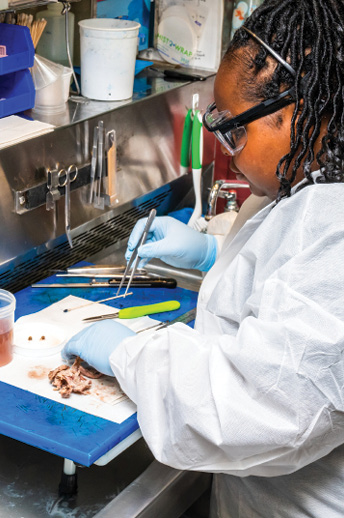
PCL has been serving Kentucky hospitals since 1967. Dr. H. Davis Chipps started P&C Labs at Central Baptist Hospital with the pathology and clinical labs at Medical Heights on Nicholasville Road, now a grocery store. It grew slowly and, by 2003, the pathology practice was serving 14 hospitals in Central Kentucky. It now serves 48 hospitals in addition to surgery centers and over 500 medical offices across Kentucky. PCL has over 134 employees working three shifts to provide accurate and timely results. From couriers with specimen tracking to EPIC interfaced reporting, PCL has provided professional and logistical assistance to hospital pathology departments while maintaining turnaround-time and improving diagnostic capabilities.
PCL’s state of the art laboratory is strategically located in Lexington’s medical district, positioned for frequent courier runs to the three major hospitals of Central Baptist, Saint Joseph Hospital, and Saint Joseph East. The last five years has seen continual renovation and modernization combined with proactive equipment acquisition in order to yield increased capacity.
Can You Rush That?
Lozano recalls when recently one of the PCL pathologists had surgery at an outside facility and was told it would take 7-10 days to get pathology results. PCL’s goal is to provide results in 24–48 hours. Turnaround time is maintained by working three shifts daily. “Teamwork and innovative management help keep the tissue specimens advancing towards completion,” says Lozano. “Our team members are known to stay past their shift or drive back to a hospital in order to answer the call. Our customer service team receives special orders and follows the patient specimen through to the final report, ensuring that stat reports are not only sent, but also received,” he says.
Area hospital administrators have confidence in PCL. Greg Giles, vice president of operations at CHI Saint Joseph Health states that CHI Saint Joseph Health has been using PCL for three and a half years for anatomic pathology and clinical laboratory services with board-certified pathologists for clinical or technical consultation. “PCL provides leadership and medical direction for our hospital and oncology center labs, ensuring we provide high quality care and meet regulatory requirements,” says Giles.
Giles continues, “PCL is a well-respected provider in Kentucky. Their experience serving institutions across the state provides valuable points of reference and expertise to help us maximize our potential and reduce costs. Their local connections and deep understanding of the needs of our patient population help us stay focused on how we can best impact the health of our community. PCL has the resources available 24/7 to support our robust technical pathology needs, which has become a difficult skill to recruit in today’s tough job market.”
Tommy Haggard, CEO, Bourbon Community Hospital says that his hospital is “pleased to partner with P&C Labs for our pathology and cytology needs, covering the gamut from technical to consultative to onsite leadership. Those services include surgical specimen workup and interpretations, assisting with laboratory policies and procedures, staff competencies, quality control, peer to peer discussions, and 24-hour call for blood bank and transfusions. PCL physicians also fully participate in physician leadership committees and hospital leadership to include board of trustee involvement. PCL is integral to Joint Commission readiness and actual survey participation,” says Haggard.
The critical need for pathology service is challenging for community hospitals. Haggard says, “It would be extremely difficult, if even possible, to maintain the full array of services offered by PCL independently for our facility. Where PCL excels is how they can tailor the full array of services they are capable of to meet the needs of the hospital. They provide and maintain equipment and supplies for specimen workup and assist with onsite procedures to ensure the testing is able to be completed in the one study such as fine needle aspiration and thyroid biopsies for adequate margins. To provide the same level of service would be cost prohibitive for a facility of our size and scope. However, with PCL, we are able to receive the same level of pathological diagnosis of much larger facilities.
Some of the Pathologists Behind the Microscope
Rick Lozano, MD, FCAP
After an internal medicine internship, on pathology residency at Emory University, Lozano completed his chief resident year and fellowship at UAB in Birmingham, Alabama. He was in private practice for seven years in Birmingham before joining PCL and the professional company Chipps, Caffrey & Dubilier, PSC Lozano says his fellowship and special interest is cytopathology and gynecologic pathology, but he also has training in GI pathology. “I have definitely developed an interest in laboratory management and business. We have the ability to bring our subspecialty brand of pathology service to Kentucky’s smallest hospitals. Our continued success is raising possibilities outside of Kentucky,” he says.
Jason Clark, MD, FCAP
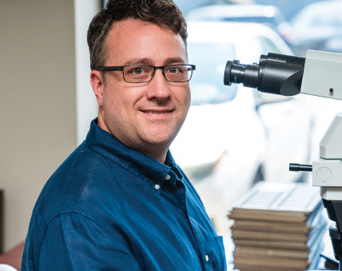
Jason Clark, MD, is president of Chipps, Caffrey & Dubilier, PSC, a multi-specialty private practice pathology group comprising 21 pathologists, the majority owner of PCL, LLC. The group provides expert diagnoses across the entire field of pathology, with specialization in hematopathology, cytopathology, dermatopathology, GI pathology, GU pathology, oral pathology, neuropathology, and molecular/IHC/flow cytometry expertise.
Clark received his undergraduate degree at the University of Indiana University; his medical degree from Indiana University School of Medicine; pathology residency from Baylor University in Dallas; and cytopathology fellowship graduation at University of North Carolina in Chapel Hill. He recognized that pathology was a natural fit for him in medical school. He joined PCL in 2012.
Clark serves as the medical director for CHI Saint Joseph East Hospital, Russell County Hospital, and Cornerstone Diagnostics, LLC. In addition, he provides anatomic pathology sign-out with a special interest in cytopathology for 45 hospitals and hundreds of private offices across the state of Kentucky. “We provide on-site coverage of frozen section procedures and radiology adequacy,” says Clark.
“I see our practice continuing to grow throughout the state of Kentucky. We aim to one day grow enough to provide expert tissue and cytology diagnoses along with laboratory medical direction for every Kentuckian across the state,” says Clark.
Brad Gibson, MD, FCAP
Brad Gibson, MD, received his medical degree from the University of Kentucky College of Medicine. He recalls that he decided in his second year of medical school that pathology was one of his interests and chose the specialty in his third year. He did his anatomic and clinical pathology residency at the University of Louisville and a hematopathology fellowship at Indiana University plus a combination general surgical pathology/gastrointestinal fellowship at Brown University.
Gibson interviewed with PCL during his first fellowship and says he knew he had found the place for him when he saw the desire to meet pathology needs across Kentucky, especially the rural areas, a desire which was evident by the number of maps in the laboratory. “Being from rural Kentucky, I understood how underserved many of these areas were and how many needs a growing company like this could provide to our state. I accepted the PCL position and began the first weekday after my last fellowship had ended, and have been working here now for a little over three years,” say Gibson.
Gibson’s main interest is in leukemia and lymphoma diagnoses. He evaluates the hematolymphoid cases from several dozen hospitals at PCL including bone marrows, lymph nodes, peripheral blood smears, and flow cytometry evaluation. He consults on gastrointestinal cases, occasionally evaluates general surgical pathology cases, and directs five laboratories across Kentucky and the immunohistochemistry section of the laboratory. Work begins around 7 a.m., prioritizing malignant and urgent cases, communicating with oncologists when critical diagnoses need to be delivered quickly, and arranging for ancillary testing.
“Discussing cases directly with physicians is particularly meaningful, as it helps us see the importance and impact of our diagnoses. I love to hear from our docs,” says Gibson.
Gibson is impressed by the breadth and volume of hematolymphoid neoplasia in his practice. He is working to expand the immunohistochemistry test menu and PDL1 testing to make results available to clinicians with a short turnaround time.
Jessica Howard, DO, FCAP
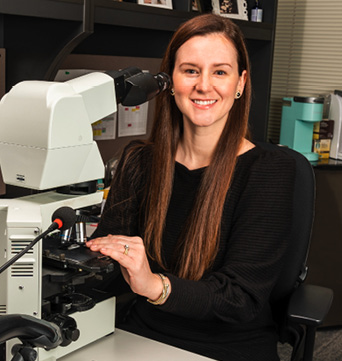
A born-and-bred Kentuckian from Bowling Green, Jessica Howard, DO, completed her undergraduate studies at WKU with a major in biology and minor in chemistry; received her Doctor of Osteopathy degree from the Kentucky College of Osteopathic Medicine; did her pathology residency at UK; and completed a surgical pathology fellowship followed by a cytology fellowship, both at UK.
Originally, Howard planned to be a pediatrician. However, while on her surgery rotation she saw how pathology interacted with surgery when a biopsy of a tumor, taken bedside and hand delivered to the pathologist, allowed the surgeon to explain the situation to the patient. “After being impressed by the pathologist’s knowledge and workplace, I was able to get an elective rotation in pathology, and I loved it so much I never looked back,” says Howard. “Pathology suits me very well. I am able to provide doctors and patients with answers, and that makes me happy.”
Howard joined PCL in 2017. She says PCL leaders understand there’s a major learning curve between coming out of training and becoming an attending pathologist. That mindset and understanding of the more senior pathologists was something she appreciated when she started. “As with every new attending, I had some struggles at first, but the partners at PCL had my back, and after two years of hard work, I was invited to become a partner. That decision has paid off for me personally and professionally and I’m constantly trying to help grow the business because I want us to continuously evolve,” says Howard.
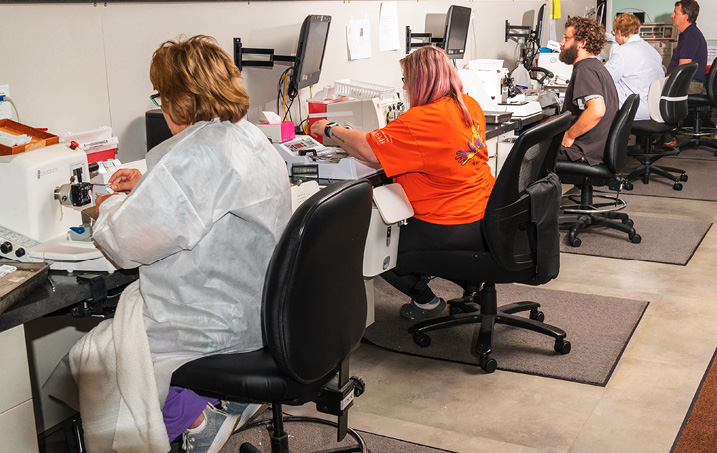
Sarah Williams, MD, FCAP
Sarah Williams, MD, attended both undergraduate and medical school in South Carolina. She grew up in Columbia, South Carolina, and spent the majority of her career working in Columbia and Charleston. Both her older sister and brother are pathologists, so she learned about pathology around the dinner table and it seemed like a natural fit.
Williams joined PCL in 2020. Her working day starts at 7 a.m. and usually involves traveling to outside facilities, with possible tumor board attendance and presentations in addition to reading cases out at the laboratory facility in Lexington.
Her area of interest is dermatopathology. “Although I am fortunate enough to look at a variety of specimens, dermatopathology is certainly my niche within the group,” says Williams.
Ed Tanous, Jr., MD, FCAP
Ed Tanous received his undergraduate BS in chemistry from Delta State University in Cleveland, Mississippi. He received his medical degree from the University of Mississippi Medical Center in Jackson, Mississippi, and did his residency at the University of Kentucky Medical Center in Lexington.
He grew up in Greenwood, Mississippi, though home has been Lexington since his residency. He chose pathology in his fourth
year of medical school after completing an elective month in pathology. He had not considered pathology until an internal medicine resident invited him to review peripheral smears. He applied for an elective rotation in pathology the next day.
Tanous works at the Clark Regional Medical Center in Winchester, Kentucky. His special area of interest is GI pathology, reviewing biopsies from the hospital’s endoscopy service. He also sees urologic, breast, skin, and gynecologic pathology, with a small amount of pulmonary and orthopedic pathology. His clinical path responsibilities include reviewing the occasional peripheral blood smear, reviewing laboratory policies and procedures, overseeing the blood bank and serving as a consultant for transfusion services, and serving as a liaison to the medical staff for the laboratory.
Tanous was in solo private practice before joined PCL in 2012. He says he feared losing independence and feared change.
“I’d been practicing solo for six years by that time, after my colleague of 14 years retired. I was comfortable where I was. Prior to joining PCL, I met many of the pathologists there in a moonlighting role, a helpful introduction to the group. That served to dispel much of the fear. Contract negotiations were not contentious, and every objection was addressed openly and honestly by the business manager and the president of the group. Once taking the plunge, I found that many of the frustrating aspects of work I’d been handling were taken away by PCL, as they had staff employed specifically to handle the pathology grossing, billing questions, supply logistics, IT frustrations, equipment maintenance, and bookkeeping. The responsibilities of running a business had been removed, and I’d gained access to a group of experienced and well-trained pathologists to consult on difficult cases. These things lifted a huge burden, to the extent that I really believe my career has been extended,” says Tanous.
In the future Tanous expects surgical pathology and cytopathology will move in the direction of molecular diagnostics, as medicine is becoming more targeted in its therapy. “There is still great need for morphologic interpretation, and I doubt that will ever be replaced. PCL is a forward-thinking and nimble business that I believe is positioning itself well to handle the new demands of this era of medical diagnosis,” says Tanous.
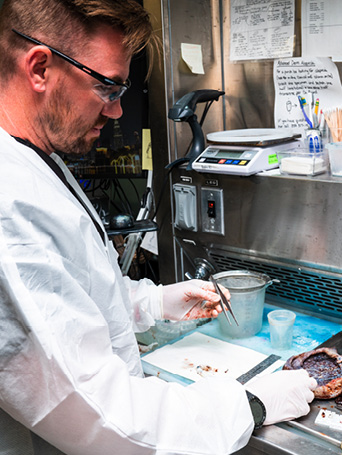
Harty Ashby, DO, FCAP
Harty Ashby, DO, likes the mystery-solving that comes with being a pathologist. She feels she is at the central point in medicine, available to discuss the pathology with physicians and helping patients. “I love the challenge of looking at slides and solving daily tissue mysteries,” says Ashby.
After graduating from UK with a BS in biology, Ashby received her DO from the University of Pikeville School of Osteopathic Medicine. She followed that with an internship at Pikeville Medical Center, then an anatomic and clinical pathology residency and fellowship in dermatopathology at Tufts Medical Center in Boston.
Ashby says she has always had a strong interest in dermatology, spending time working with dermatologists during college and medical school. Dermatopathology was the best way to combine her interests. Her special areas of interest within the practice are melanocytic lesions, inflammatory skin diseases and cutaneous manifestations of systemic disease.
Ashby joined PCL in April 2019. With the diverse subspecialties within the practice, she can show cases to colleagues without sending out to other laboratories.
Other Members
Additional members of the practice are: Fred L. Picklesimer, Jr, MD, FCAP; Patrick C. Crowe, MD, FCAP; John F. Jansen, MD, FCAP; George Kim, MD, FCAP; Jason Mull, MD, FCAP; Douglas Damm, DDS; Craig Fowler, DDS; Christine Meece, MD, FCAP; Justine B. Sedlak, MD, FCAP; Filip G. Garrett, DO, FCAP; William J. Beuerlein, DO, FCAP; Keith Henry, MD, FCAP; and Autumn V. Hammonds, DFO, FCAP.
A Partnership Like No Other
While PCL is the machine that never sleeps, the pathologists are the driving force. PCL has the complete package: seasoned veterans, motivated associates, and a trained technical staff. The PCL leadership partners work the bench as well as manage, so they can oversee quality and consistency in their departments
PCL offers subspecialty service that rivals most university centers: seven cytopathologists, three hematopathologists, three oral pathologists, two dermatopathologists, one GI pathologist, one neuropathologist, one molecular pathologist, and special training in breast, GI, GU, and soft tissue.
A pathologist has four major roles in the hospital: directing the clinical lab, signing out pathology cases, performing on-site procedures, and serving on hospital committees. The post-COVID-19 era has seen pathologist shortages throughout Kentucky and the U.S. The change has been swift and the demand alarming. Without clinical lab direction, an entire hospital could shut down. Without pathology reports, treatments are delayed. Committees are often mandated and regulated. On-site procedures are a vestige of the past. Even some large hospital systems throughout the U.S. have had to extend their normal turnaround-time for anatomic pathology reports by several days or more. However, PCL has been able to maintain a consistent one- to two-day turnaround time throughout the COVID era.
“We strive to provide the standard of care service while looking towards clinical necessity and data-driven solutions. We are faithful, honest, hard-working and positioned to serve all of Kentucky,” says Lozano.



